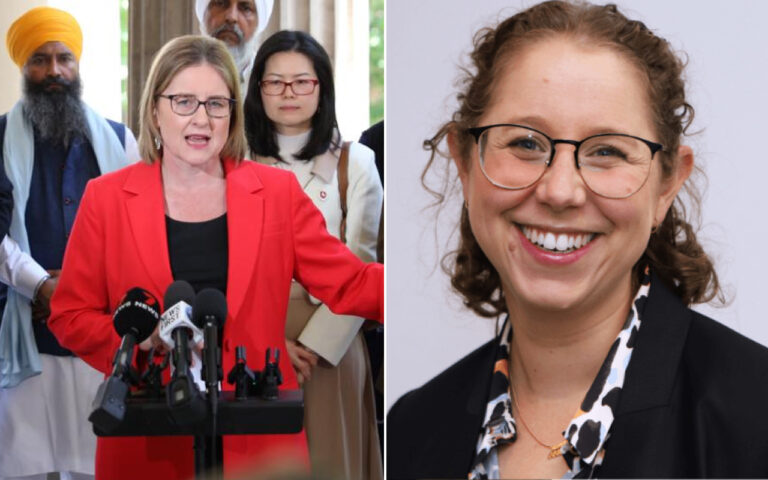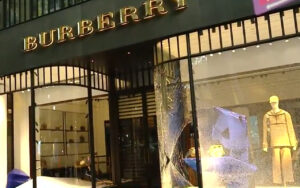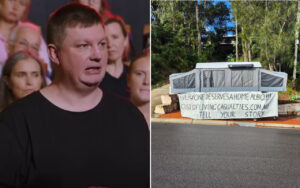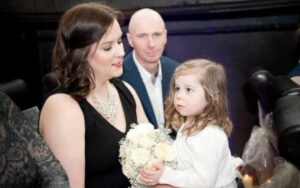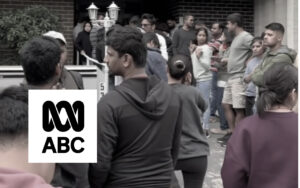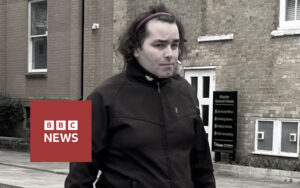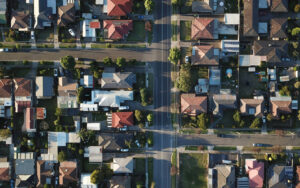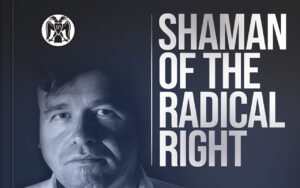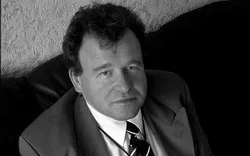Jewish community leaders have called on the Victorian government to speed up the implementation of controversial new anti-vilification laws that punish “hate speech” with prison sentences of up to five years.
Premier Jacinta Allan and Attorney-General Jaclyn Symes announced the Justice Legislation Amendment (Anti-vilification and Social Cohesion) Bill 2024 on Tuesday, but it cannot be debated until parliament resumes in February, and Ms Symes said the criminal elements would only come into effect six months after the laws passed.
She also confirmed minors could be charged under the legislation in “limited circumstances, the Herald Sun reported, while Ms Allan said the new laws “support social cohesion by making it easier for police to charge anyone found to be inciting violence against specific groups or individuals on the basis of their race, religion and more”.
But the Jewish Community Council of Victoria said the laws should be passed sooner, and argued they should go even further in order to stop people using “proxy words” and cover the boycotting of businesses on the basis of race or religion.
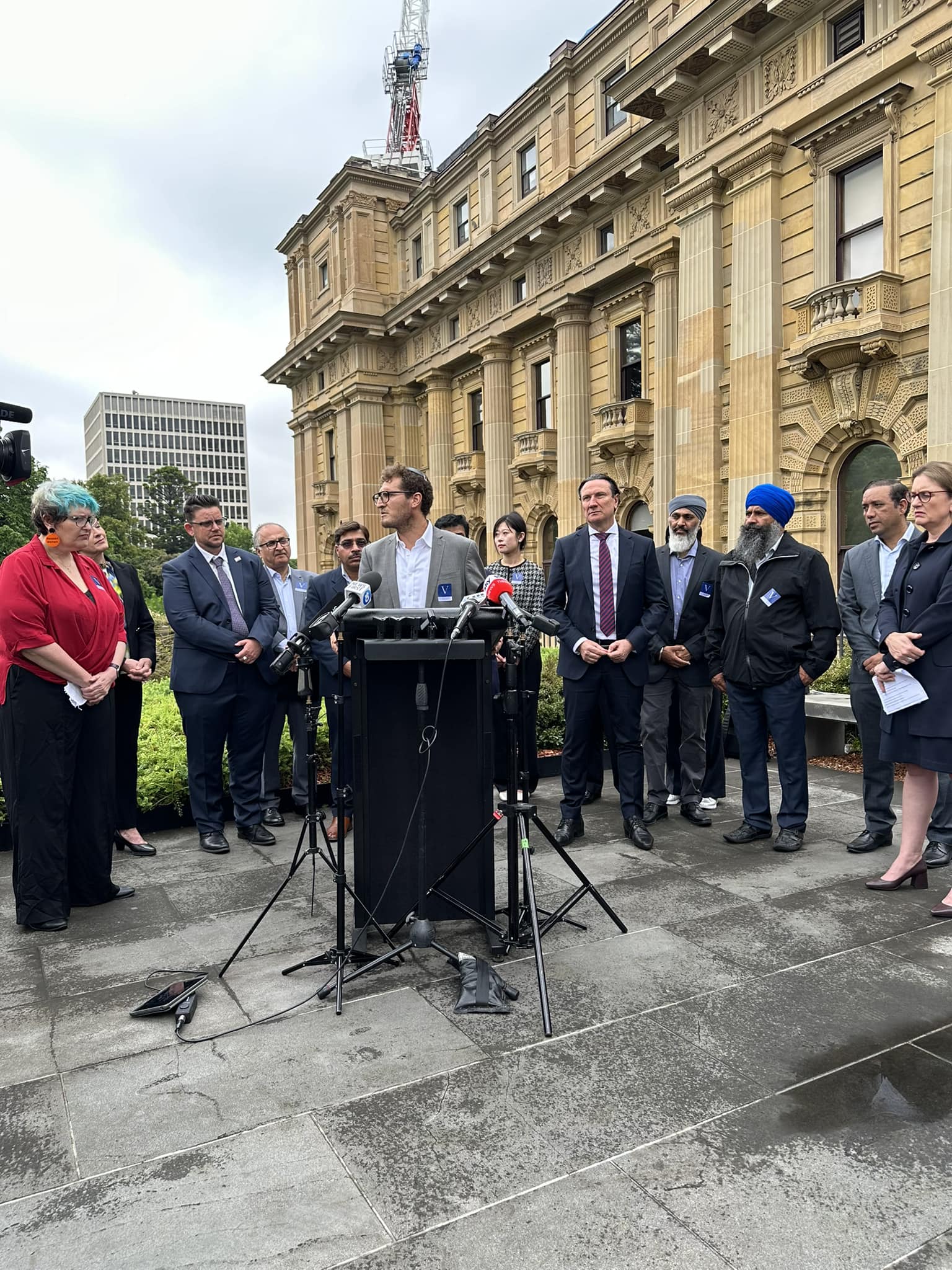
“Our current weak laws have meant that for far too long, Victorians have been able to get away with vilifying and assaulting Jews and people from other minority groups. We are pleased that the Victorian Government has taken steps to strengthen both the civil and criminal vilification laws,” CEO Naomi Levin said on Tuesday.
“We urge the Parliament to speedily debate and implement these essential reforms. It would be regrettable if implementation were to drag out into the second half of 2025.
“The Jewish community supports the Bill’s proposals to criminalise incitement to hatred and to introduce stronger penalties for those who are found guilty of incitement. It is welcome that this Bill also seeks to address vilification in online, given how much hate speech is spread through social media and extremist websites.
“These reforms must address other emerging challenges, including stopping individuals who try to circumvent laws by using proxy words to vilify a particular minority and individuals who seek to boycott business-owners because of their religious, racial or ethnic identity.”
Rabbi Gabi Kaltmann, who worked with the Attorney-General to help draft the legislation, spoke alongside Ms Allan and Ms Symes on Tuesday, calling the amendments “long overdue” and welcoming the punishment of “vilification” with criminal charges.
The legislation updates were originally proposed to combat “islamophobia”, but were then altered to cover anti-Semitism and vilification of homosexuals and people with gender delusions.
The proposed changes to the Racial and Religious Tolerance Act 2001 expand vilification protection from race and religion to cover so-called gender identity, sex, sexual orientation and disability, and lower the threshold for police to lay criminal charges.
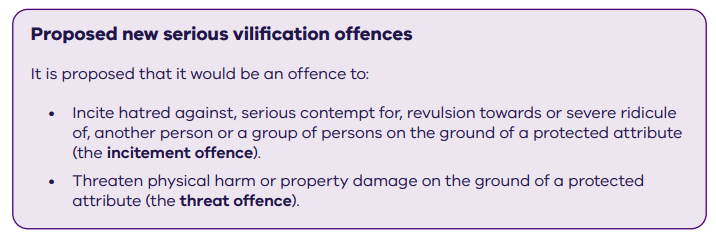
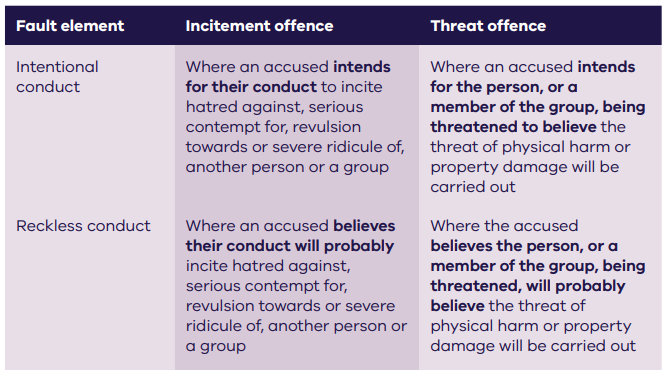
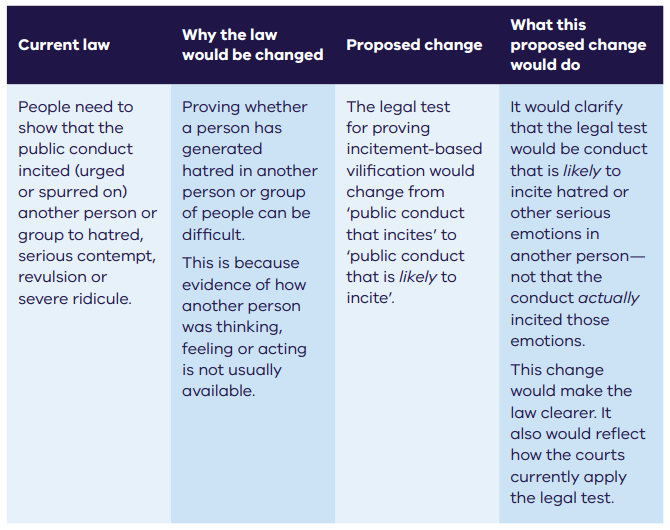
The laws would make it an offence to “incite hatred against, serious contempt for, revulsion towards or severe ridicule of, another person or a group of persons on the ground of a protected attribute”, add a threat offence, and would cover “reckless conduct” whereas the current legislation only covers “intentional conduct”.
Online the laws would apply to anyone anywhere who vilifies a person in Victoria, and offline to both private and public interactions, but there would be a “political purpose defence” added for the incitement offence only.
Two additional “civil protections” would also be added to the Equal Opportunity Act – a modified incitement-based protection and a harm-based protection, both intended to “capture public conduct (including online) that is hateful or incites hate”.
The incitement-based protection would “prohibit conduct that is likely to incite hatred against, serious contempt for, revulsion towards or severe ridicule of another person or group based on a protected attribute”.
The harm-based protection defines speech or conduct as vilification if it is “s reasonably likely to be considered harmful from the perspective of a person or a member of a group with that attribute”.
The current serious vilification offences have a maximum penalty of 6 months imprisonment or $11,855.40, or both, but under the proposed reforms “the incitement offence would have a maximum penalty of 3 years imprisonment, and the threat offence would have a maximum penalty of 5 years imprisonment”.
Christians have warned the harsh new laws will leave them open to persecution and fear they will be weaponised by far-left activists, and the Catholic Archdiocese of Melbourne has said it was concerned about the restriction of religious freedom, while Jewish, Muslim and homosexual group leaders have welcomed the changes.
The Australian Christian Lobby has been urging MPs to vote against the changes, saying they will put Christians at greater risk of persecution.
“Under a new harm-based legislative reform, an expression of Christian faith, whether in speech or conduct, in public or online, could amount to vilification if it is considered harmful by someone who claims their protected attributes have been discriminated against,” Victorian ACL director Jasmine Yuen said.
“This sets a dangerous precedent, introducing a subjective element into the law. Victorians of faith will potentially be stifled, or even prosecuted, for expressing a religious view on Biblical sexual ethics and biology. It opens a door for Christians to be targeted and brought before a tribunal by activists.
“If successful, this bill will only exempt religious ‘statement, publication, discussion or debate’ with ‘genuine purpose’ and ‘truly in the public interest’ from vilification.”
“The problem with making speech illegal based on vague perceptions of hate is deciding who gets to determine what qualifies as hateful speech and what does not.”
Thank you, Liberal MP Nicole Werner, for raising these concerns about the proposed changes to Victoria’s… pic.twitter.com/LHTbfK1q1h
— Australian Christian Lobby (@ACLobby) November 3, 2024
The Catholic Archdiocese of Melbourne also expressed concerns, saying the laws could potentially create more community division.
“Attempts to lower the threshold of what constitutes vilification must not stifle genuine discussion and acts done in good faith, particularly the sharing of religious beliefs,” a spokesperson said.
Rabbi Kaltmann said last month that tensions between Jews and Muslims since October 7 showed there was an “urgent need” for stronger laws, and told ABC News the reforms were going to make “more and more Victorians safe”.
Islamic Council of Victoria president Adel Salman said imams should be able to talk about sexuality and gender without fear of persecution but welcomed the changes overall and endorsed the lower threshold for criminal charges.
“The number one target of islamophobia are hijabi women of colour. They’re women, they’re obviously Muslim, and they’re of colour … they should be considered aggravating factors. And so the offence for that should be even greater,” he said.
Son Vivienne, CEO of Transgender Victoria, a non-profit advocacy group that receives state government funding, said it was religious leaders would only be prosecuted for their teachings if they incited hate.
“It’s really deep and powerful when we see lawmakers actually acknowledge our right to be the way we are regardless of how we present, or our pronouns, or our names,” he said.
Victorian Libertarian MP David Limbrick has called on free speech advocates to oppose the laws, saying last month: “This is really serious stuff. You can go to jail for three years for ridicule.
“They want to include behaviour that incites hatred or other serious emotions. But the government’s actions incite serious emotions in me all the time.”
Header image: Left, Premier Jacinta Allan with multicultural leaders last week (Facebook). Right, Jewish Community Council of Victoria CEO Naomi Levin (JCCV).
You may have heard about the Federal Government’s misinformation bill, but did you know there’s a new free speech fight brewing right here in Victoria? #springst pic.twitter.com/iyWrQvCMVF
— David Limbrick MP ? (@_davidlimbrick) October 1, 2024
